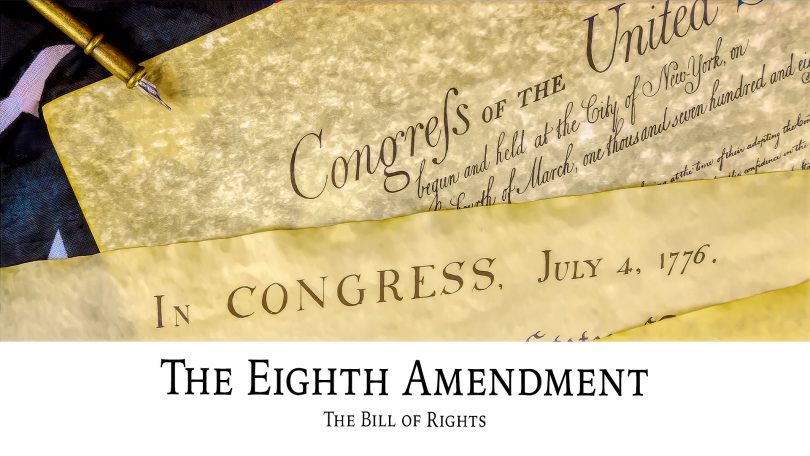In keeping with their concern for protecting what they viewed as the natural (i.e., given by nature) legal rights of the citizens of the new United States, the Founding Fathers added to the legal protections they had provided in previous amendments with a few extra ones in the eighth. This amendment is well-known for its prohibition on “cruel and unusual punishment,” but it also has a few other things to say. It is a short amendment, coming in at just a one-line sentence. Yet, the protections that are packed into that simple amendment are important to the people in this country, even into modern times.
The Eighth Amendment
Excessive bail shall not be required, nor excessive fines imposed, nor cruel and unusual punishments inflicted.
What Does it Mean?
This is another amendment that takes some of the abuses of the English judicial system that the Founding Fathers saw (and that some of them and their families experienced), and improves upon them to protect the people of their own new nation. At the time this amendment was written, it was commonplace for people suspected (not even convicted) of the most petty of crimes to be kept behind bars, sometimes for years awaiting trial, because of outrageous amounts of bail imposed on them for their release. Judges knew these common people likely could not pay the bail, and the bail ordered was definitely completely out of proportion for the crime supposedly committed.
The eighth amendment prohibits excessive bail. Unfortunately, it does not spell out what excessive bail is considered to be, thus leaving it up to each individual judge to decide for him or herself. The US Supreme Court has not yet made a ruling on their interpretation of what constitutes excessive bail. So, while our implementation of this amendment may not be perfect today, the fact that the Founding Fathers decided it was something important to protect us against is significant. It is still an issue today, but maybe not as much of an issue as it would have been without this Constitutional protection.
In the same vein as the prohibition on excessive bail, the Founding Fathers also stuck a prohibition on excessive fines into this amendment. This was because the fines imposed for any crime, no matter how minor, could bankrupt a family in England, and the person was often not allowed to be released from jail until the fine was paid. This is, after all, the country that only a century before had made condemned prisoners pay their executioner out of their own pocket. The Founding Fathers wanted to protect their people against this scenario. Like with prohibition on excessive bail, there is no explanation of what is considered excessive, but it is a better protection than other countries had at the time, and that even some of them have today.
Finally, there is the prohibition against cruel and unusual punishments for those convicted of crimes. England was a country, at that time, that endorsed torture, gruesome methods of execution like drawing and quartering, and would sometimes make women walk naked in front of their friends and neighborhoods in their home villages as penance for what were considered shameful acts.
The Founding Fathers wanted any punishments that were deemed necessary to be humane, without any creativity employed in discovering just how painful or demeaning a punishment could be. As with the other items in this amendment, the issue is the lack of explanation of exactly what they considered to be cruel and unusual. This has been left to courts from local ones to the Supreme Court to decide over the centuries, and they still do. But, unlike countries of history or even some of today, at least the effort is made to follow the spirit of this amendment.

